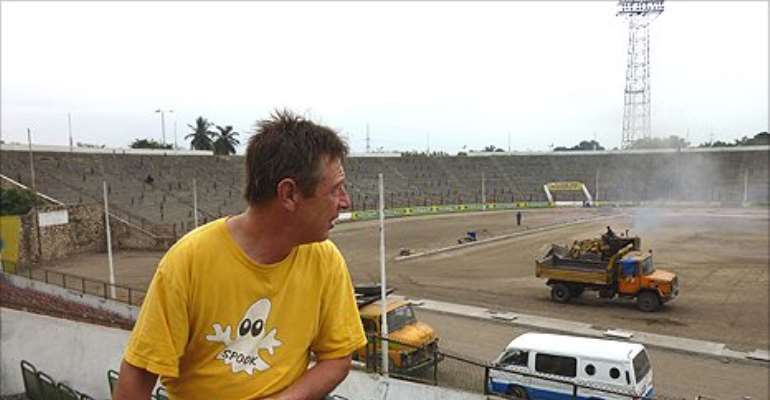SAD DECAY OF KINSHASA’S RUMBLE STADIUM

By Andy Kershaw
Kinshasa, DR Congo
The arena that once hosted the legendary “Rumble in the Jungle” boxing match between George Foreman and Muhammad Ali is now a scene of faded glory.
The first surprise – in this city in which only the unpredictable is predictable – was that I got in, beyond the stadium gates, without hindrance and without having to cough up a bribe.
A straggle of human traffic was coming and going and, slipping into the flow, I simply wandered through.
Muhammad Ali won the fight and regained the title against the odds
The Tata Raphael Stadium – just like the Congo, it has reverted to its original name – was called the 20th May Stadium in October 1974, in a country then freshly rebranded as Zaire.
And it commemorates the Belgian Catholic priest and philanthropist whose enthusiasm and organisation of sport for Congolese youth got it built in 1951 – Tata (Father) Raphael.
Just inside the gates, there is a monument to the old missionary's generosity but, absurdly, nothing to recognise that it was in this arena that the most celebrated fight in boxing history took place.
'Lightning bolt'
We were all scared for Muhammad Ali that night.
At 32, he was too old. His younger, fearsome opponent, George Foreman – the champion – was too strong.
We wanted a miracle. We expected catastrophe. Ali was in danger of wrecking his own legend.
For more than seven shocking rounds, Ali – against the ropes – soaked up Foreman's punches, all the while taunting his opponent.
“Is that the best ya got, George?” he yelled through his gloves.
“Harder, sucker, swing harder. You the champion. They told me you could punch.”
Routinely, in training, Foreman's blows had split open the heavy bag.
Early in the eighth, with a lightning bolt of a right, Ali flattened Big George to become – against all predictions – Heavyweight Champion for the second time.
And the world went nuts.
Crumbling and mildewed
Now it might sound daft to say I felt sorry for a stadium but gazing out from the top of the terraces the other day, I did.
Evidence of its night of glory and history is now camouflaged by decay.
The seating and handrails have rusted in places to powder. Trees and shrubs are sprouting through the crumbling cement of some of the walkways.
Litter rattles along the aisles. Excrement is everywhere.
I made my way into – and I choose the word with precision – the bowels of the arena, where I knew the fighters' dressing rooms had been.
Some rooms are used for selling refreshments to workers
A few yellowed and ragged newspaper cuttings about Muhammad Ali somehow clung to the peeling, light blue institutional paint.
A mildewed United States flag hung from a nearby pillar.
A few steps in the semi-darkness and then… instant recognition, from photos in my boxing books and the footage in the documentary When We Were Kings.
This was Ali's dressing room.
I recognised the columns and the vents on the wall. It was just there where Ali had lain on a bench straight after his triumph, truly to feel Foreman's heavy blows for the first time.
Thirty-six years later and the room is again occupied.
'Gloomy bunker'
From behind a yellow curtain and as though in disgrace, emerged a young man.
A slender girl came out to follow him. She was carrying a child, which she placed down on the floor to crawl in the dirt.
Muhammad Ali's Rumble in the Jungle throne room is home for Makula Kaunda, his wife Sandrine and their one-year-old daughter Jessica.
Their tenancy of this now squalid, gloomy bunker is legitimate. Government-approved, in fact.
“We can't afford a house. I earn only US$19 (£12) a month,” Makula explained. “I am a civil servant, working for the ministry of sport. The ministry lets us stay here.”
The couple allowed me to look behind their curtain.
Under a line of washing, was a single plastic chair, a washing-up bowl and a paraffin stove. And that was it.
There is no mains water. Their toilet is the stadium, Makula explained.
Quick exit
I wanted to see what had become of George Foreman's billet but two men, of no identifiable position or authority, blocked my path.
What did we want? I told them and showed them our government press accreditation.
For Ali, the Rumble in the Jungle was one of his greatest fights
“Impossible to go there,” one said.
“You need the permission of le chef,” said the other.
Chef? Boss? Surely, no-one was employed to administer a derelict, defunct stadium?
“I will go and get him,” said the first chap, and he beetled off into the dark.
My local translator was getting very jumpy.
“Come on. Come on. We must go. The boss is going to want a lot of money from us. And if we don't pay, we'll be arrested.”
So we hastened for the smelly stairs.
In doing so, halfway between the dressing rooms, we passed some rusting steel gates, across a tunnel.
At the far end, was daylight and a glimpse of the stadium pitch. This, then, must have been the route that Ali walked that night towards true greatness.
I lingered just for a second and imagined the electricity of that moment.
Then tearing myself away – and with something less than greatness – I scurried out to the anonymity of the street.
